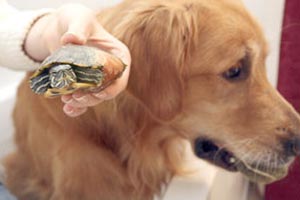March 17th 2007
Gary Burghoff, M*A*S*H
 When Gary was growing up, he had
a lot of close friends. But the ones he went home to everyday
after school were his animal friends, his dog Patch and cats Flippy,
Buttons & Bows. Gary states that animals have a way to bring
people together and keeping them connected. Many years ago Gary
was asked to judge a duck painting contest. After three days of
judging, he was inspired and he decided to create his own wildlife
art.
When Gary was growing up, he had
a lot of close friends. But the ones he went home to everyday
after school were his animal friends, his dog Patch and cats Flippy,
Buttons & Bows. Gary states that animals have a way to bring
people together and keeping them connected. Many years ago Gary
was asked to judge a duck painting contest. After three days of
judging, he was inspired and he decided to create his own wildlife
art.
Boy Raises $20,000 for the Animals
with Lemonade Stand
Kyle Orent
 Kyle Orent, an 8-year-old from
Northport, New York has raised more than $20,000 for Canine Companions
for Independence through sales at his lemonade stand. Orent hopes
to raise an additional $10,000 for the non-profit organization,
which trains dogs to help people with disabilities.
Kyle Orent, an 8-year-old from
Northport, New York has raised more than $20,000 for Canine Companions
for Independence through sales at his lemonade stand. Orent hopes
to raise an additional $10,000 for the non-profit organization,
which trains dogs to help people with disabilities.
Last month, he met his idol, Donald Trump,
but politely didn't solicit the mogul. "I didn't want him
to feel obligated," Kyle said. "I just wanted to thank
him for giving me good ideas." Kyle, a fan of Trump's TV
show, wrote a letter that won the sympathy of Trump's secretary.
He and his mother, Kathy, then showed up at Trump Towers in Manhattan
and were invited in for a brief session.
To raise the additional $10,000, he'll
organize a golf tournament and an auction of autographed dog collars.
Celebrities from George Clooney to former president Bill Clinton
previously gave autographs.
"Few young people at that age would
have his perseverance," said his principal, Sabina Larkin,
of Ocean Avenue School.
Tune in to hear this amazing young man.
http://www.CanineCompanions.org
Dog Trainer to the Stars
Tyson Kilmer, Dogs Incorporated
 Tyson Kilmer is known as the dog-training
guru of today's Hollywood canines. Since at a young age, Tyson
had a knack for training animals, it was his birthright. Tyson
began working with every type of animal, yet he always had a special
affinity for working with canines. Without any formal instruction,
Tyson began training his family's dogs and soon after, friends
and neighbors hired him to do the same for their pets who were
unresponsive to traditional training methods. With his own selftaught
style, Tyson found that his system of obedience training was extremely
effective regardless of the animal's age, temperament or breed.
Tyson Kilmer is known as the dog-training
guru of today's Hollywood canines. Since at a young age, Tyson
had a knack for training animals, it was his birthright. Tyson
began working with every type of animal, yet he always had a special
affinity for working with canines. Without any formal instruction,
Tyson began training his family's dogs and soon after, friends
and neighbors hired him to do the same for their pets who were
unresponsive to traditional training methods. With his own selftaught
style, Tyson found that his system of obedience training was extremely
effective regardless of the animal's age, temperament or breed.
Having professionally trained dogs throughout
his youth, Tyson was approached by a modeling scout at the age
of 15 and began a lucrative career as a professional model. Though
still training dogs as a hobby, Tyson spent the next decade traveling
the world and gracing international runways as a model for such
high-end designers such as Issey, Hugo Boss, Dolce & Gabbana
and Jean Paul Gaultier. He also graced the pages of many prestigious
fashion magazines such as Harper's Bazaar, Vogue, Elle and Marie
Claire among others.
By the age of 25, Tyson lost his passion
for modeling and realized how much more enjoyment he has training
dogs for his friends and others seeking his expertise. He soon
settled in Los Angeles to launch his dog training company, Tyson
Kilmer Dogs Inc., and using his connections in the fashion
industry, Tyson instantly became the most sought after dog trainer
in Hollywood. His celebrity clientele includes Sheryl Crow, Rob
Lowe, Marilyn Manson, Mike Tyson, Joni Mitchell, Aaron Carter,
Rose McGowan, Mark McGrath, Steve Carr and Mathieu Kassovitz,
among others. Despite his success in Hollywood, Tyson most enjoys
training dogs for those people who want to live in harmony with
their canine companions.
Listen in and find out what some of the celebs have asked him
to train their dogs to do!
http://www.TysonKilmer.com
Turtle Eaten Alive Survives!
Britt Savage
 When it got cold outside, 12-year-old
Shelby Terihay of Ithia, Florida decided it was too cold outside
for her turtles, so she brought them inside and put them in the
bathtub.
When it got cold outside, 12-year-old
Shelby Terihay of Ithia, Florida decided it was too cold outside
for her turtles, so she brought them inside and put them in the
bathtub.
Even though Shelby thought it was a good
idea, the family's golden retriever thought it was an even better
idea. In fact, he decided that they were lunch.
When Shelby noticed one of the turtles
missing, she informed her family who then noticed the dog licking
his lips. Expecting the worst, they then forced the dog to drink
peroxide to induce vomiting.
After about 10 minutes, the little green
turtle was expelled and began to move about. Both the turtle and
dog are doing fine.
HSUS Exposes Scandal in the Fashion
Industry
Kristin Leppert, Fur-Free Campaign
HSUS
 The Humane Society of the United
States urged speedy passage of a bill to require honest labeling
of fur and to bar the import of a dog species from China, so that
dogs are not killed to make fashion garments passed off as harmless
"faux fur." The legislation was introduced today on
the heels of an ongoing HSUS investigation exposing the widespread
scandal in the fashion industry.
The Humane Society of the United
States urged speedy passage of a bill to require honest labeling
of fur and to bar the import of a dog species from China, so that
dogs are not killed to make fashion garments passed off as harmless
"faux fur." The legislation was introduced today on
the heels of an ongoing HSUS investigation exposing the widespread
scandal in the fashion industry.
A team of HSUS investigators found a proliferation of falsely
labeled and falsely advertised dog fur on fashion clothing sold
by some of the largest names in U.S. retailing. Of the fur-trimmed
jackets subjected to mass spectrometry testing by The HSUS, 96
percent were found to be domestic dog, wolf or raccoon dog, and
either mislabeled or not labeled at all. The raccoon dog is a
member of the dog family with markings resembling those of a raccoon,
known to be skinned alive for fur in China.
Nordstrom's, Tommy Hilfiger and Bluefly.com advertised jackets
trimmed with fur from domestic dog as "faux," The HSUS
discovered. The dog fur appeared as trim on the hoods of coats
from popular brands such as Joie, Tommy Hilfiger and Andrew Marc.
Additionally, The HSUS revealed that J.C. Penney was selling raccoon
dog fur mislabeled as raccoon. The retailer pulled the garments,
blacked out the name of the species from the label and returned
the coats to the floor to be sold.
 The designers
involved include well-known brands such as Diddy's Sean John,
Jay-Z's Rocawear, Beyoncé Knowles' Deréon, Calvin
Klein, Andrew Marc, Michael Kors, Oscar de la Renta, Bogner, Baby
Phat and DKNY. Many designers and retailers were shocked by The
HSUS's test results: Deréon, Macy's, Rocawear and Sean
John pulled the offending garments, with Rocawear and Sean John
pledging not to use raccoon dog fur in the future, and Calvin
Klein announced it will phase out the use of all fur.
The designers
involved include well-known brands such as Diddy's Sean John,
Jay-Z's Rocawear, Beyoncé Knowles' Deréon, Calvin
Klein, Andrew Marc, Michael Kors, Oscar de la Renta, Bogner, Baby
Phat and DKNY. Many designers and retailers were shocked by The
HSUS's test results: Deréon, Macy's, Rocawear and Sean
John pulled the offending garments, with Rocawear and Sean John
pledging not to use raccoon dog fur in the future, and Calvin
Klein announced it will phase out the use of all fur.
Half of all fur garments entering the
United States come from China, where large numbers of domestic
dogs and cats as well as raccoon dogs are killed every year for
their fur by brutal methods, sometimes skinned alive. The Dog
and Cat Protection Act of 2000 banned the trade in domestic dog
and cat fur after an HSUS investigation revealed the death toll
at 2 million animals a year and found domestic dog fur for sale
in the United States.
The Moran-Ferguson legislation will outlaw
raccoon dog fur and close a loophole in the Fur Products Labeling
Act of 1951 that exempts garments with a "relatively small
quantity or value" of fur from requiring labels disclosing
the name of the species, the manufacturer, the country of origin
and other pertinent information for consumers. The Federal Trade
Commission defines that value today as $150-an amount that allows
multiple animal pelts on a garment without a label.
Don't buy real fur by mistake! TAKE ACTION
ask you representative for truth in fur labeling! And take the
Fur-Free Pledge at https://community.hsus.org/campaign/furfreepledge_jay
http://www.FurFree.HSUS.org
Good, Bad & Ugly of Declawing
Leo Bloom, Declaw Hall of Shame
 The Declaw Hall of Shame publishes
the names of veterinarians and animal hospitals as well as other
individuals and organizations that practice, promote, and perpetuate
the cruel and needless practice of digital amputation, popularly
and euphemistically known as declawing.
The Declaw Hall of Shame publishes
the names of veterinarians and animal hospitals as well as other
individuals and organizations that practice, promote, and perpetuate
the cruel and needless practice of digital amputation, popularly
and euphemistically known as declawing.
Please boycott the veterinarians and clinics
listed on this site. Contact them and let them know that their
behavior is inhumane and unacceptable.
 You will also find
the "Pimp of the Month." A real declawing pimp promotes
declawing in a particularly outrageous manner, lies about declawing,
or describes their favorite method of declawing as humane. No
credible discussion of alternatives.
You will also find
the "Pimp of the Month." A real declawing pimp promotes
declawing in a particularly outrageous manner, lies about declawing,
or describes their favorite method of declawing as humane. No
credible discussion of alternatives.
Listen in to find out why claws are so
important for a cat, that declawing isn't just removal of the
nail and what alternatives are available.
http://www.DeclawHallOfShame.com
Man Sues After Dog Dies on Cross-Country
Air Trip
Terrence Ing
 For one San Francisco pet, the
seemingly safe trip across the country on American Airlines proved
to be fatal. "Willie," a two-year-old English bulldog
died after arrival from a cross-country flight last year. Terrence
Ing, the owner of Willie, placed his dog under the care of American
Airlines to safely transport his pet on a New York to San Francisco
flight. Ing never expected Willie was not going to make the trip
alive.
For one San Francisco pet, the
seemingly safe trip across the country on American Airlines proved
to be fatal. "Willie," a two-year-old English bulldog
died after arrival from a cross-country flight last year. Terrence
Ing, the owner of Willie, placed his dog under the care of American
Airlines to safely transport his pet on a New York to San Francisco
flight. Ing never expected Willie was not going to make the trip
alive.
Upon arrival in San Francisco, Terrence
noted that Willie was having difficulty in breathing. An American
Airlines baggage manager denied him access to Willie and had the
dog relocated pending instructions from airline superiors. It
was only after Ing contacted several area veterinarians that animal
paramedics arrived five hours after the flight landed. By then,
Willie had died. An animal paramedic who examined Willie's body
at the airport believes the dog may have survived had American
Airlines provided adequate medical care.
Terrence states that American Airlines
has done nothing to improve the handling of animals since Willies'
death. Now, Terrence is taking America Airlines to court.
http://www.AnimalLawAssociates.org
http://www.lclark.edu/org/ncal/willie.html
Bill Will Help Minnesota Regulate Puppy
& Kitten Mills
Mike Fry, Animal Ark Animal
Shelter and Host of Animal Wise Radio
 Senate
File 121 and House File 1046 Need Your Support!
Senate
File 121 and House File 1046 Need Your Support!
On January 18, 2007 a bill authored by
Senator Don Betzold was introduced in the Minnesota Legislature
to address puppy and kitten mills in Minnesota. The companion
bill in the Minnesota House or Representatives is House File 1046.
Minnesota is among the top states for mass-produced puppies and
kittens (referred to as puppy mills and catteries) with the number
of dog and cat breeders increasing annually. Many animals live
out their lives in small, overcrowded wire cages and are bred
repeatedly. Their cages are often stacked, allowing feces and
urine to fall onto the animals below. Animals may be sick from
inadequate food, water and veterinary care, stress, fleas, worms,
etc. Many have deformed paws, are severely matted, or are burned
from sitting and standing in urine and feces. These animals are
then sold to the public.
But there are no specific State laws that regulate dog and cat
breeders. While the licensing of certain breeders and dealers
falls under the United States Department of Agriculture (USDA),
many breeders are not required to be licensed and aren't inspected.
Loopholes exist and federal enforcement resources are scarce.
The public increasingly demands accountability from puppy and
kitten mill breeders.
S.F. 121 closes the gap in State law by giving state and local
officials the tools they need to: (1) license and inspect dog
and cat breeders in Minnesota, (2) make sure those breeders meet
specific standards of care, and (3) take appropriate enforcement
action to protect vulnerable dogs and cats from unscrupulous or
negligent breeders.
Ironically, at least one group most people
would think should support this bill has come out against it.
The American Kennel Club, or AKC has launched a campaign to get
small, private breeders to oppose this bill. In doing so, they
have spread false information about S.F. 121.
AKC has asked small breeders to oppose
this bill because they say it would create an unnecessary burden
on small, responsible breeders. However, the opposite is true.
Small breeders are, in fact, specifically exempted from this bill.
Moreover, Senate File 121 would likely help small breeders by
enforcing a more level care standard across this industry.
Currently, small responsible breeders
provide care standards beyond what is required in S.F. 121, yet
they are forced to compete in the marketplace with large-scale
puppy and kitten mills who often do not even meet the lowest of
standards required by the USDA.
Requiring large, commercial breeders to
increase their care standards would, therefore, only help the
smaller breeders.
On a recent appearance on Animal Wise
Radio AKC Communications Director Lisa Peterson had a difficult
time trying to explain the AKC's position on this bill. Following
much obfuscation, her argument eventually came down to this statement,
"Well, you know, we like to believe that, ah, dogs are your
property. And, by law, they are considered that. And we like to
leave the option to the owner of the property, of the dog, with
the breeder because its their right. It's their decision as to
how to, um, how many intact females to own or how many litters
to produce."
It is worth noting that Senate File 121
does not limit the number of animals a breeder may have, breed
or sell. It simply sets minimum care standards for breeders who
maintain 6 or more intact, breeding females.
For people concerned with animal welfare
or for those concerned with maintaining quality breeding standards,
S.F. 121/H.F. 1046 is a bill to support.
Please let your State Senator and State
Representative know that you support this effort.
http://www.AnimalWiseRadio.com
http://www.AnimalArkShelter.org
Kow Boy Kitty Gets Shot
Eli Grimes
 When
Eli adopted his cat Sylvester from the St. Augustine Humane Society
in Florida a few years ago, little did he know that Sylvester
would change his life.
When
Eli adopted his cat Sylvester from the St. Augustine Humane Society
in Florida a few years ago, little did he know that Sylvester
would change his life.
Eli has been able to teach Sylvester several
tricks, and, in fact, Sylvester will do tricks to save the lives
of other animals at the shelters. Sylvester can open the cabinet
door and get his own treats, but his best trick is playing dead.
When Eli "shoots" him, Sylvester will roll over and
play dead. View
the video.
http://www.EliGrimes.com
Heat Stroke in Dogs
Dr. Jim Humphries, Veterinary
News Network
 You know it stays hot even through
September and people find all sorts of ways to keep cool, but
what about our animals? How should we keep them cool? Yes, even
into the fall thousands of dogs find their way into the family
veterinary office or even the emergency room after spending just
a few hours in the hot sun.
You know it stays hot even through
September and people find all sorts of ways to keep cool, but
what about our animals? How should we keep them cool? Yes, even
into the fall thousands of dogs find their way into the family
veterinary office or even the emergency room after spending just
a few hours in the hot sun.
As most people know, dogs don't sweat
like we do, they most often cool themselves by panting. Anything
that inhibits that natural cooling system can lead to heat stroke.
Normally a dog's temperature ranges from 100 to 102.5. In cases
of heat stroke, temperatures over 106 degrees are considered to
be an emergency, and temperatures over 110 degrees can be fatal
in less than 15 minutes.
Here are the symptoms you need to watch
for:
- Vigorous panting
- The inability to stand or weakness while
standing
- Thick, ropey saliva, literally foaming
at the mouth
- Bright red mucous membranes, although
some dogs may show pale or even muddy gums
Use cool, not cold, tap water on the extremities.
This will help effectively lower the body temperature. Do not
use ice or extremely cold water. While this may seem logical,
extreme cold water will cause the surface blood vessels to contract,
forming an insulated area that traps heat in the body and literally
stops the cooling of these vital internal organs. Without these
life savings steps, many dogs could lose their lives to a simple
hot day. Then load you pet carefully into the car quickly and
get your pet to the veterinarian office.
http://www.VetNewsNet.com
The Horses in My Life
Monty Roberts
 Monty Roberts, a world-renowned
horse trainer and international best-selling author, is best known
as 'The Man Who Listens to Horses." He is also known as "The
Horse Whisperer," made famous by the Robert Redford film
and Nicholas Evans book. He has spent his whole life working with
horses - schooling them, listening to them, and learning their
equine language. The essence of his training techniques is non-violence.
Rather than break his horses he "gentles" them. With
over 1500 demonstrations of his "gentling" techniques
performed on 6,000 horses in 22 countries, Monty's message, "Violence
is never the answer," is being listened to as never before.
Listen as he tells his incredible story.
Monty Roberts, a world-renowned
horse trainer and international best-selling author, is best known
as 'The Man Who Listens to Horses." He is also known as "The
Horse Whisperer," made famous by the Robert Redford film
and Nicholas Evans book. He has spent his whole life working with
horses - schooling them, listening to them, and learning their
equine language. The essence of his training techniques is non-violence.
Rather than break his horses he "gentles" them. With
over 1500 demonstrations of his "gentling" techniques
performed on 6,000 horses in 22 countries, Monty's message, "Violence
is never the answer," is being listened to as never before.
Listen as he tells his incredible story.
http://www.MontyRoberts.com
Listen to the
1st Hour ABRIDGED VERSION Podcast of this show (#381).
Purchase
a CD Copy of this Show
 View Animal Radio
Network® Broadcast Schedule in a new window.
View Animal Radio
Network® Broadcast Schedule in a new window.
 Listen to Animal Radio® - Go to the launch page
Listen to Animal Radio® - Go to the launch page
 Return to Animal
Radio Network® Home Page
Return to Animal
Radio Network® Home Page
 Read
March Newsletter
Read
March Newsletter
Copyright 2007 All Rights
Reserved Animal Radio Network LLC
 When Gary was growing up, he had
a lot of close friends. But the ones he went home to everyday
after school were his animal friends, his dog Patch and cats Flippy,
Buttons & Bows. Gary states that animals have a way to bring
people together and keeping them connected. Many years ago Gary
was asked to judge a duck painting contest. After three days of
judging, he was inspired and he decided to create his own wildlife
art.
When Gary was growing up, he had
a lot of close friends. But the ones he went home to everyday
after school were his animal friends, his dog Patch and cats Flippy,
Buttons & Bows. Gary states that animals have a way to bring
people together and keeping them connected. Many years ago Gary
was asked to judge a duck painting contest. After three days of
judging, he was inspired and he decided to create his own wildlife
art. Kyle Orent, an 8-year-old from
Northport, New York has raised more than $20,000 for Canine Companions
for Independence through sales at his lemonade stand. Orent hopes
to raise an additional $10,000 for the non-profit organization,
which trains dogs to help people with disabilities.
Kyle Orent, an 8-year-old from
Northport, New York has raised more than $20,000 for Canine Companions
for Independence through sales at his lemonade stand. Orent hopes
to raise an additional $10,000 for the non-profit organization,
which trains dogs to help people with disabilities. Tyson Kilmer is known as the dog-training
guru of today's Hollywood canines. Since at a young age, Tyson
had a knack for training animals, it was his birthright. Tyson
began working with every type of animal, yet he always had a special
affinity for working with canines. Without any formal instruction,
Tyson began training his family's dogs and soon after, friends
and neighbors hired him to do the same for their pets who were
unresponsive to traditional training methods. With his own selftaught
style, Tyson found that his system of obedience training was extremely
effective regardless of the animal's age, temperament or breed.
Tyson Kilmer is known as the dog-training
guru of today's Hollywood canines. Since at a young age, Tyson
had a knack for training animals, it was his birthright. Tyson
began working with every type of animal, yet he always had a special
affinity for working with canines. Without any formal instruction,
Tyson began training his family's dogs and soon after, friends
and neighbors hired him to do the same for their pets who were
unresponsive to traditional training methods. With his own selftaught
style, Tyson found that his system of obedience training was extremely
effective regardless of the animal's age, temperament or breed.
 When it got cold outside, 12-year-old
Shelby Terihay of Ithia, Florida decided it was too cold outside
for her turtles, so she brought them inside and put them in the
bathtub.
When it got cold outside, 12-year-old
Shelby Terihay of Ithia, Florida decided it was too cold outside
for her turtles, so she brought them inside and put them in the
bathtub. The Humane Society of the United
States urged speedy passage of a bill to require honest labeling
of fur and to bar the import of a dog species from China, so that
dogs are not killed to make fashion garments passed off as harmless
"faux fur." The legislation was introduced today on
the heels of an ongoing HSUS investigation exposing the widespread
scandal in the fashion industry.
The Humane Society of the United
States urged speedy passage of a bill to require honest labeling
of fur and to bar the import of a dog species from China, so that
dogs are not killed to make fashion garments passed off as harmless
"faux fur." The legislation was introduced today on
the heels of an ongoing HSUS investigation exposing the widespread
scandal in the fashion industry. The designers
involved include well-known brands such as Diddy's Sean John,
Jay-Z's Rocawear, Beyoncé Knowles' Deréon, Calvin
Klein, Andrew Marc, Michael Kors, Oscar de la Renta, Bogner, Baby
Phat and DKNY. Many designers and retailers were shocked by The
HSUS's test results: Deréon, Macy's, Rocawear and Sean
John pulled the offending garments, with Rocawear and Sean John
pledging not to use raccoon dog fur in the future, and Calvin
Klein announced it will phase out the use of all fur.
The designers
involved include well-known brands such as Diddy's Sean John,
Jay-Z's Rocawear, Beyoncé Knowles' Deréon, Calvin
Klein, Andrew Marc, Michael Kors, Oscar de la Renta, Bogner, Baby
Phat and DKNY. Many designers and retailers were shocked by The
HSUS's test results: Deréon, Macy's, Rocawear and Sean
John pulled the offending garments, with Rocawear and Sean John
pledging not to use raccoon dog fur in the future, and Calvin
Klein announced it will phase out the use of all fur. The Declaw Hall of Shame publishes
the names of veterinarians and animal hospitals as well as other
individuals and organizations that practice, promote, and perpetuate
the cruel and needless practice of digital amputation, popularly
and euphemistically known as declawing.
The Declaw Hall of Shame publishes
the names of veterinarians and animal hospitals as well as other
individuals and organizations that practice, promote, and perpetuate
the cruel and needless practice of digital amputation, popularly
and euphemistically known as declawing. You will also find
the "Pimp of the Month." A real declawing pimp promotes
declawing in a particularly outrageous manner, lies about declawing,
or describes their favorite method of declawing as humane. No
credible discussion of alternatives.
You will also find
the "Pimp of the Month." A real declawing pimp promotes
declawing in a particularly outrageous manner, lies about declawing,
or describes their favorite method of declawing as humane. No
credible discussion of alternatives. For one San Francisco pet, the
seemingly safe trip across the country on American Airlines proved
to be fatal. "Willie," a two-year-old English bulldog
died after arrival from a cross-country flight last year. Terrence
Ing, the owner of Willie, placed his dog under the care of American
Airlines to safely transport his pet on a New York to San Francisco
flight. Ing never expected Willie was not going to make the trip
alive.
For one San Francisco pet, the
seemingly safe trip across the country on American Airlines proved
to be fatal. "Willie," a two-year-old English bulldog
died after arrival from a cross-country flight last year. Terrence
Ing, the owner of Willie, placed his dog under the care of American
Airlines to safely transport his pet on a New York to San Francisco
flight. Ing never expected Willie was not going to make the trip
alive. Senate
File 121 and House File 1046 Need Your Support!
Senate
File 121 and House File 1046 Need Your Support! You know it stays hot even through
September and people find all sorts of ways to keep cool, but
what about our animals? How should we keep them cool? Yes, even
into the fall thousands of dogs find their way into the family
veterinary office or even the emergency room after spending just
a few hours in the hot sun.
You know it stays hot even through
September and people find all sorts of ways to keep cool, but
what about our animals? How should we keep them cool? Yes, even
into the fall thousands of dogs find their way into the family
veterinary office or even the emergency room after spending just
a few hours in the hot sun. Monty Roberts, a world-renowned
horse trainer and international best-selling author, is best known
as 'The Man Who Listens to Horses." He is also known as "The
Horse Whisperer," made famous by the Robert Redford film
and Nicholas Evans book. He has spent his whole life working with
horses - schooling them, listening to them, and learning their
equine language. The essence of his training techniques is non-violence.
Rather than break his horses he "gentles" them. With
over 1500 demonstrations of his "gentling" techniques
performed on 6,000 horses in 22 countries, Monty's message, "Violence
is never the answer," is being listened to as never before.
Listen as he tells his incredible story.
Monty Roberts, a world-renowned
horse trainer and international best-selling author, is best known
as 'The Man Who Listens to Horses." He is also known as "The
Horse Whisperer," made famous by the Robert Redford film
and Nicholas Evans book. He has spent his whole life working with
horses - schooling them, listening to them, and learning their
equine language. The essence of his training techniques is non-violence.
Rather than break his horses he "gentles" them. With
over 1500 demonstrations of his "gentling" techniques
performed on 6,000 horses in 22 countries, Monty's message, "Violence
is never the answer," is being listened to as never before.
Listen as he tells his incredible story.